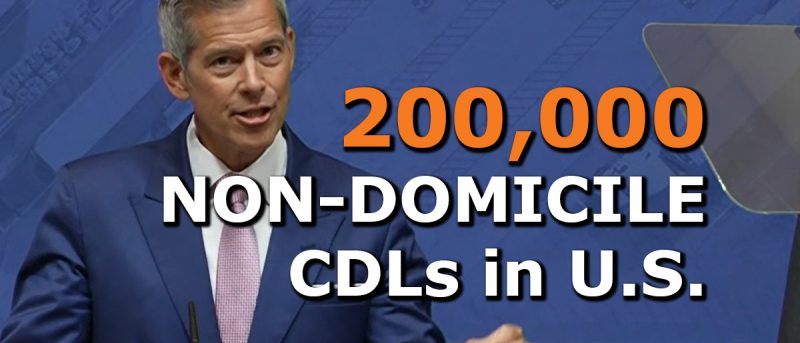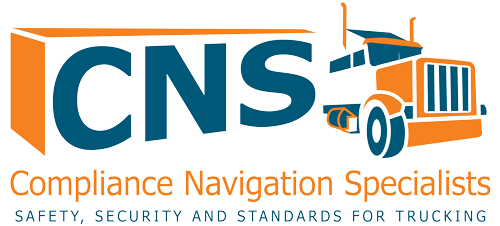Non-Domiciled Truck CDL Licensing Under Fire: Secretary Duffy Announces Immediate Emergency Safety Reforms

Roughly 200,000 (5%) of interstate CDLs are held by non-domiciled drivers, plus 20,000 temporary permits.
Washington, D.C. — Transportation Secretary Sean Duffy, alongside FMCSA Chief Counsel Jesse Elison, delivered a major announcement Friday on sweeping reforms to the non-domiciled Commercial Driver’s License (CDL) program.
The move comes after a string of deadly truck crashes and a nationwide audit revealing widespread flaws in how states issue CDLs to foreign nationals.
“This process is 100% broken,” said Duffy, pointing to cases where unqualified drivers were licensed and later involved in catastrophic accidents.
NEW TRAINING: English Language Proficiency Assessment is available! – CLICK HERE TO LEARN MORE or SIGN UP!
Crashes That Brought the Issue to the Forefront
- March 14, 2025 – 17-Vehicle Pileup: The driver had a history of ignoring Hours of Service rules and traffic signs.
- May 7, 2025 – Early-Career Fatal Crash: The driver failed a skills test for speeding but was still hired. He crashed just three days into the job.
- August 12, 2025 – Unauthorized U-Turn Incident: The driver, who had prior speeding violations and questionable English language proficiency (ELP), caused a fatal crash.
These tragedies prompted the DOT to launch a nationwide audit of non-domiciled CDL programs. The findings were concerning.
What the Audit Found
The FMCSA investigation uncovered systemic problems:
- Fraud & Abuse: Thousands of licenses that should never have been issued slipped through due to lax oversight and system flaws.
- Unqualified Drivers on the Road: Current regulations allowed unsafe and unqualified individuals to obtain CDLs.
- State-Level Failures: Some states—including California, Pennsylvania, Colorado, South Dakota, Texas, and Washington—were singled out for failing to comply with federal standards.
In California alone, an FMCSA review of 145 of the 3,000 non-domiciled CDL filed revealed that 25% were issued improperly.
Immediate Federal Action
Two emergency measures were announced:
1. Emergency Rule – Effective Immediately
All states must pause issuance of non-domiciled CDLs until they comply with new federal eligibility standards.
States failing to comply risk losing federal highway funding.
2. California Non-Compliance Letter
California must immediately pause issuance on non-domiciled CDLs and conduct an audit of the program.
The state has 30 days to respond to non-compliance letter and reply with Corrective Action Plan to come back into compliance or face $160 million in withheld highway funds.
New Strict Eligibility Standards for Non-Domiciled Drivers
- Must lawfully enter the U.S. under H-2A (agricultural workers), H-2B (non-agricultural workers), and E-2 (treaty investors) visa programs, and to provide a foreign passport and I-94/I-94A document at every issuance and renewal.
- States must use federal databases to verify lawful status.
- Licenses will expire after one year with in-person renewals only.
- Employment documentation alone is no longer sufficient proof of eligibility.
The FMCSA estimates the rule will reduce the number of active non-domiciled CDLs by 90,000.
Industry Impact
Roughly 200,000 (5%) of interstate CDLs are held by non-domiciled drivers, plus 20,000 temporary permits. While the reforms could reduce the available labor pool, Secretary Duffy dismissed fears of a driver shortage, stating the trucking industry has “sufficient domestic capacity.”
Still, critics argue the crackdown may disrupt certain freight sectors that have relied on foreign drivers to meet demand. Others see the move as necessary to restore safety and integrity to the CDL system.
What Motor Carriers Need to Do Now
With heightened scrutiny, carriers should take proactive steps:
- Audit Driver Qualification Files (DQFs): Review all CDLs—especially non-domiciled licenses—under 49 CFR § 383.73(f).
- Assess English Proficiency: Screen for English Language Proficiency (ELP) during onboarding; provide training where gaps exist.
- Follow FMCSA Updates Closely: Expect new disqualification rules and state enforcement actions.
- Strengthen Compliance Protocols: Build verification checks for non-domiciled drivers into safety and HR systems.
- Engage Experts: Partner with compliance organizations and industry groups like CVSA for guidance on best practices.
The Road Ahead
The FMCSA has made clear this is “not the end of the story.” States named in the audit—California, Pennsylvania, Colorado, South Dakota, Texas, and Washington—must rescind improperly issued licenses and submit corrective action plans within 30 days.
Failure to comply will trigger federal enforcement, including funding cuts and potential criminal investigations into fraud.
For carriers, the message is clear: review your rosters, reinforce compliance, and prepare for stricter oversight of non-domiciled drivers.
CNS Can Help
At Compliance Navigation Specialists (CNS), we know that FMCSA changes like this can create challenges for carriers already juggling compliance, safety, and daily operations.
Our experts can help you take proactive steps now to ensure full compliance and ensure your business avoids costly delays.
Contact CNS today to make sure your operating authority and compliance needs are covered, call us at 888.260.9448 or email at info@cnsprotects.com.
Questions about DOT Compliance, Licensing, Audits, Programs, etc.?
Our DOT Specialists are here to help!
What are you searching for?
Is DOT Compliance your Top Priority?
Our DOT Compliance Programs ensure it is your top priority and keeps your business running.
Related Services
Subscribe to our Monthly Newsletter
Receive the latest transportation and trucking industry information about FMCSA and DOT Audits, Regulations, etc.
Related news
Trucking News
Get the latest trucking news on DOT Compliance, Licensing, Audits, and more!

DOT SAP Program Explained (2026 Guide)
Requirements, Timeline, Costs, and What Drivers Need to Know Drug and alcohol violations remain one of the fastest ways for CDL drivers to be removed

New Law Codifies English Language Proficiency as an Out-of-Service Violation
On February 4, 2026, President Trump signed into law a federal funding bill that not only ended a partial government shutdown but also delivered several

Paper Medical Cards Still Valid: FMCSA Issues 60-Day NRII Transition Waiver for CDL Drivers
The Federal Motor Carrier Safety Administration (FMCSA) has issued a new waiver related to the National Registry II (NRII) medical certification process, extending temporary flexibility
